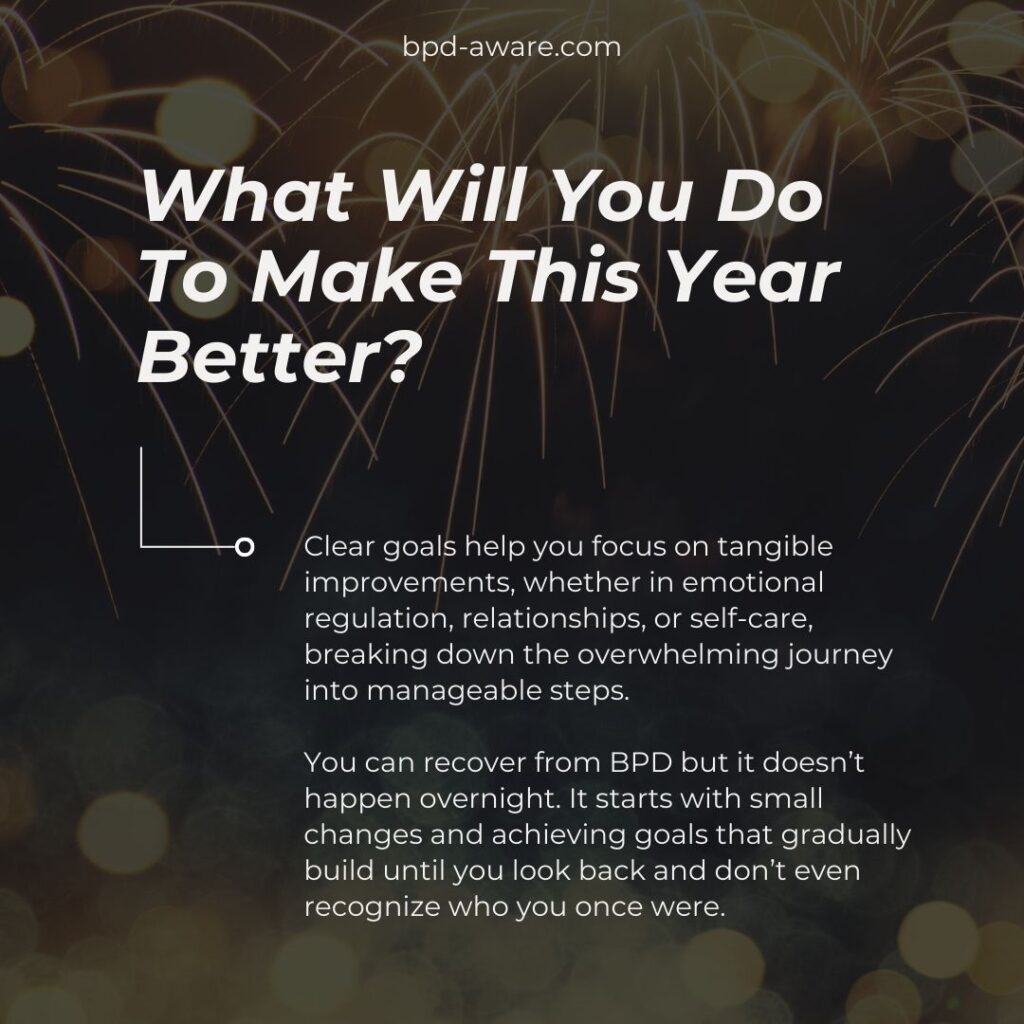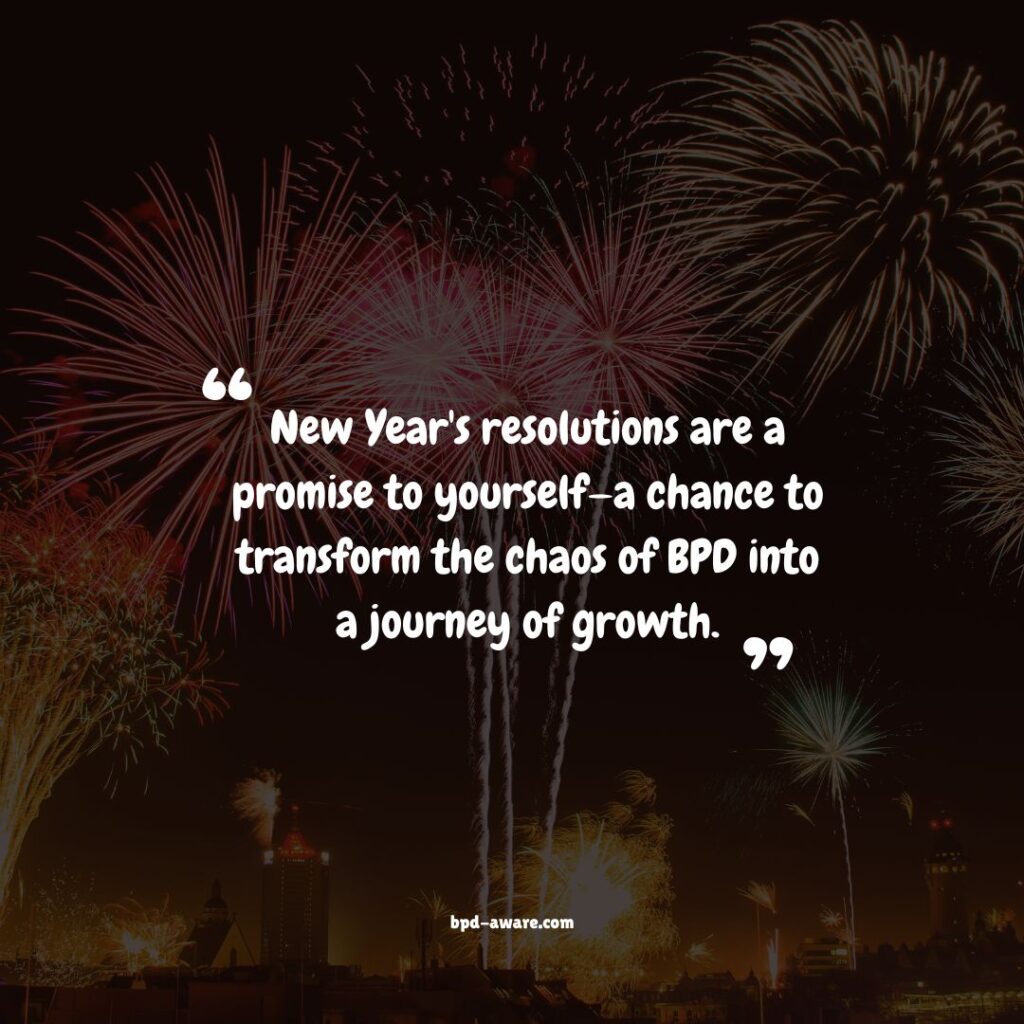A new year is almost upon us and with it comes a fresh chance to look at our lives and think about the areas we’d like to improve. When you live with borderline personality disorder (BPD), those areas can feel glaringly obvious. All of us want to get better but where do you even begin? When there’s so much to work on, it can feel overwhelming to come up with a set of New Year’s Resolutions that will help you recover from BPD.
Thankfully, there are methods for setting resolutions that are proven more effective than randomly selecting some targets. We’ll talk more about specific resolution ideas later, but for now, we want to focus on what makes a good, actionable resolution that you’re more likely to stick to.

Setting Actionable New Year’s Resolutions To Improve BPD
Be Selective About The Number of Resolutions – When there’s a lot about yourself and your life that you want to improve, it can be tempting to create a laundry list of resolutions you want to achieve. However, making many changes in a short period is often overwhelming and more often than not results in failure. It’s better to choose three resolutions than twelve, so you can really focus your energies on them. If you have a large list of resolutions, it’s a good idea to whittle it down to two or three that you believe are the most important ones to you.
Set Specific Goals – The more specific the resolution the more likely it is you’ll be able to achieve it. Wanting to make a full recovery from BPD is a lofty goal that will take many steps. While it should always be the ultimate goal for anyone with a mental health problem to overcome it, it doesn’t make for the best resolution as it’s rather vague and complex. Instead, make resolutions from the steps you need to take on the road to recovery.
For example, exercising for thirty minutes a day, four days a week is a specific and definable goal that will undoubtedly have a positive effect on your mental well-being. At the start of 2024, I set myself the goal of running my first marathon. I knew this would be good for me as it would provide structure to my life, get me out in nature, get me (a lot of) exercise, and it was easy to define whether I was successful or not – all of which made it a good resolution with plenty of benefits to both my physical and mental health.
Plan Your Resolutions – Once you’ve narrowed down what your resolutions will be this year, you also need to plan how you’re going to achieve them. Take a moment to consider the goal you have in mind and the steps you’ll need to take to achieve it. Going back to my resolution to run my first marathon, when I decided to do that I looked online for running plans built for people looking to run a marathon. I chose a plan that gave me the exact distances I’d need to run each day to build up my stamina to where I’d be able to run 26.2 miles on the day.
When it comes to more directly BPD-specific goals, there may not be strict plans available online but there will be advice you can find from people and websites like ours where you can get an idea of the things you’ll need to do to achieve your goals.
Write Down Your Resolutions – Committing your resolutions to a written record can help ingrain them in your mind and serve as a valuable reminder of what you want to achieve in the year ahead – especially if your willpower is starting to flag.
It can be a good idea to write your resolutions out multiple times and leave them in positions around your house that you will see often. You can also type them out in the notes section of your phone for an extra reminder.
These written resolutions can also include bullet points of how you plan on achieving these goals.
If, for example, you plan to eat a healthier diet in the year ahead, putting a reminder of that on the fridge door can be useful when your willpower is dipping.
Remember To Be Flexible – Very few goals are achieved with 100% success along the way. Whatever your resolution is, there will be days where you either can’t or don’t want to follow the type of lifestyle you should be following to achieve it. That’s okay and perfectly normal.
What’s not okay is to come across failure and then completely abandon the resolution because of some imperfection. Even if something goes terribly wrong, you can always pick yourself up, dust yourself off, and start again. This means showing compassion towards yourself and accepting that it’s likely that life will get in the way of your goals at times.
You should also be ready to be flexible with your goals and how you set out to achieve them. You might find that the goal you set was a little too lofty, or maybe not lofty enough. Likewise, some methods you try to achieve that goal might work really well, while others don’t work for you. This is where it’s important to be flexible and change your goal slightly if necessary, and how you’re going to go about achieving it.
On average it takes 66 days for behavior to become a habit, so those first couple of months are the toughest time and when people usually quit their resolutions. Give yourself some grace and be prepared for the initial ups and downs of trying to form a new habit.
For example, I was very disciplined with my running regime, and fortunately, that worked for me during my marathon training block. However, if the weather was truly terrible or I’d injured myself and couldn’t run then my backup plan was to continue to do cardio on my exercise bike. And, if my body hadn’t taken well to the marathon training, I would have considered dropping down to a half-marathon. This is the sort of flexibility you have to have in mind when you consider your resolutions. What alternatives are available if things don’t go well or if they go much better than expected?
Ideas For New Year’s Resolutions When You Have BPD
Focus On One Positive Habit – If you’d like to start with a simple resolution then focusing on one positive habit might be the best one you can do. That habit can be something as small as waking up and first drinking a glass of water before you reach for the caffeine or something a little larger like hitting a certain step counter every day. These are positive habits that can improve your wellness and have an impact on the symptoms of your BPD.
Start A BPD Journal – Keeping a journal of your life will help you identify things that trigger your condition, allow you to explore your emotions in a constructive manner, and help to keep yourself accountable to your goals. It’s something you can spend ten minutes a day on that will provide a big benefit.
For more on how to keep a journal that will help you in your recovery from BPD, please read our article:
Pick Up A New Healthy Hobby – Having hobbies that you enjoy can provide a distraction that stops you from ruminating on bad moments. They can also, in their own right, boost your physical or mental health.
Examples of some good hobbies for people with BPD include hiking, gardening, yoga, running, weight lifting, creative writing, drawing, painting, and sewing. There are literally hundreds of fantastic hobbies you can choose from.
To get more hobby ideas and discover even more about their potential benefits, please read our article:
Limit Social Media Use – Social media can be a great way to communicate with people you might otherwise never get the chance to meet or even be a way to keep in touch with friends and family. However, there is undoubtedly a negative side to social media.
Whether it’s politics, trolls, or spam accounts, social media can be triggering for people with BPD. It can also provide comparison points that make you feel worse about yourself. Very little of what you see on social media is a true reflection of the realities of that person or their life.
Limiting social media use, or quitting altogether, can feel like a burden has been lifted.
For more on the drawbacks of social media when you have BPD, please read our article:
Follow A Self-Care Plan – If you’re someone who responds best to order and structure then creating (and following) your own self-care plan is an excellent way to get a better handle on your life. This can include healthy meal plans, days to read, days to get exercise, daily activities to perform that make you feel calmer, and anything else you wish to include.
This can be more involved and complex than some of the other resolutions on this list, but the rewards can also be much greater. When you find a plan that works for you, it can have huge benefits for your mental health and your life in general.
Begin Therapy – Therapy is considered the best way to recover from borderline personality disorder. If you have BPD and have the means to enter therapy, then you should strongly consider doing so. Making it your New Year’s resolution is a great way to push yourself to enter therapy.
Of course, there’s not just a big button you can push to start therapy. You need to research therapists who treat BPD in your locality and read reviews. However, with the internet, this can often be done in just one evening.
And if there are no suitable therapists in your area, you may want to consider online therapy as an alternative. It can be easier to find a therapist with a strong record treating BPD when you have the number of options online therapy provides. It can also be more flexible and affordable too.

Final Thoughts
A new year can provide an opportunity to take a look at your life and consider areas in which you’d like to make a positive change. This can be the impetus required to make significant strides towards goals in your life, goals that can help you recover from BPD.
By choosing a small number of challenging, attainable goals and having a plan on how you’re going to achieve them, you can start making real, definable progress.
It’s important to remember that change doesn’t happen overnight, nor does it happen without setbacks. You must be prepared to fail and bounce back from failure to keep moving forward.
Of course, the start of the year isn’t the only time you can commit to change. Whether it’s January or June when you’re reading this, the best time to commit to improving yourself is always NOW. Don’t wait or hesitate. Choose to make a change and plan the best way to make that change. You won’t regret it.
Sources, Resources, and Further Reading
- 7 Tips To Keep Your New Year’s Resolution: https://health.ucdavis.edu/blog/cultivating-health/7-tips-to-keep-your-new-years-resolution/2022/12
- Borderline Personality Disorder: The New Year, Resolutions and Change: https://beatanxiety.me/borderline-personality-disorder-the-new-year-resolutions-and-change/
- 65 Achievable New Year’s Resolutions You’ll Actually Keep: https://www.goodhousekeeping.com/health/wellness/advice/g985/achievable-new-year-resolutions
- New Year Resolutions: https://www.mindtools.com/a8mlh20/new-year-resolutions
- The Ultimate Guide to Setting and Keeping Better New Year’s Resolutions: https://alidamw.medium.com/the-ultimate-guide-to-setting-and-keeping-better-new-years-resolutions-89ea6a818ea4
















